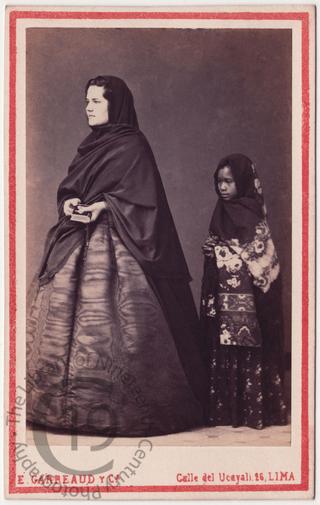
Señorita Abruyes and servant girl
Simultaneously demure and coquettish, the tapadas Limeñas - the hidden women of Lima - were a unique expression of the Peruvian capital’s cultural identity. Centred primarily on the street, they could most often be seen in the early morning on their way to and from Mass, often accompanied by a servant, or during the early evening promenade, when all the city was afoot. The women who adopted the fashion embraced its anonymity, which allowed them to engage in flirtations and transgressive intrigues outside the strict restraints of formal society. In practised hands the modest folds of a woollen or cashmere cloak became erotic and provocative, blurring social distinctions and allowing pock-marked hags to behave as seductively as the local belle. Grace and elegance were highly valued, preferably accompanied by a ready wit, while urban myths inevitably arose relating the tale of the husband who unwittingly courted his own wife.
Archbishops denounced the custom and the authorities made repeated attempts to ban it on the grounds that it was immoral but the women of Lima remained defiant and the fashion lingered on, a romantic link with the colonial period and an expression of female independence in a male-dominated society. However, by the time these portraits were taken in the 1860s and 1870s, the tradition was already disappearing. The popularity of the veiled tapada as a subject for local photographers was based largely on a voyeuristic appreciation of her ‘exotic otherness’ and a nostalgia for the city’s lost past.
Photographed by E. Garreaud of Lima.
Code: 124395




